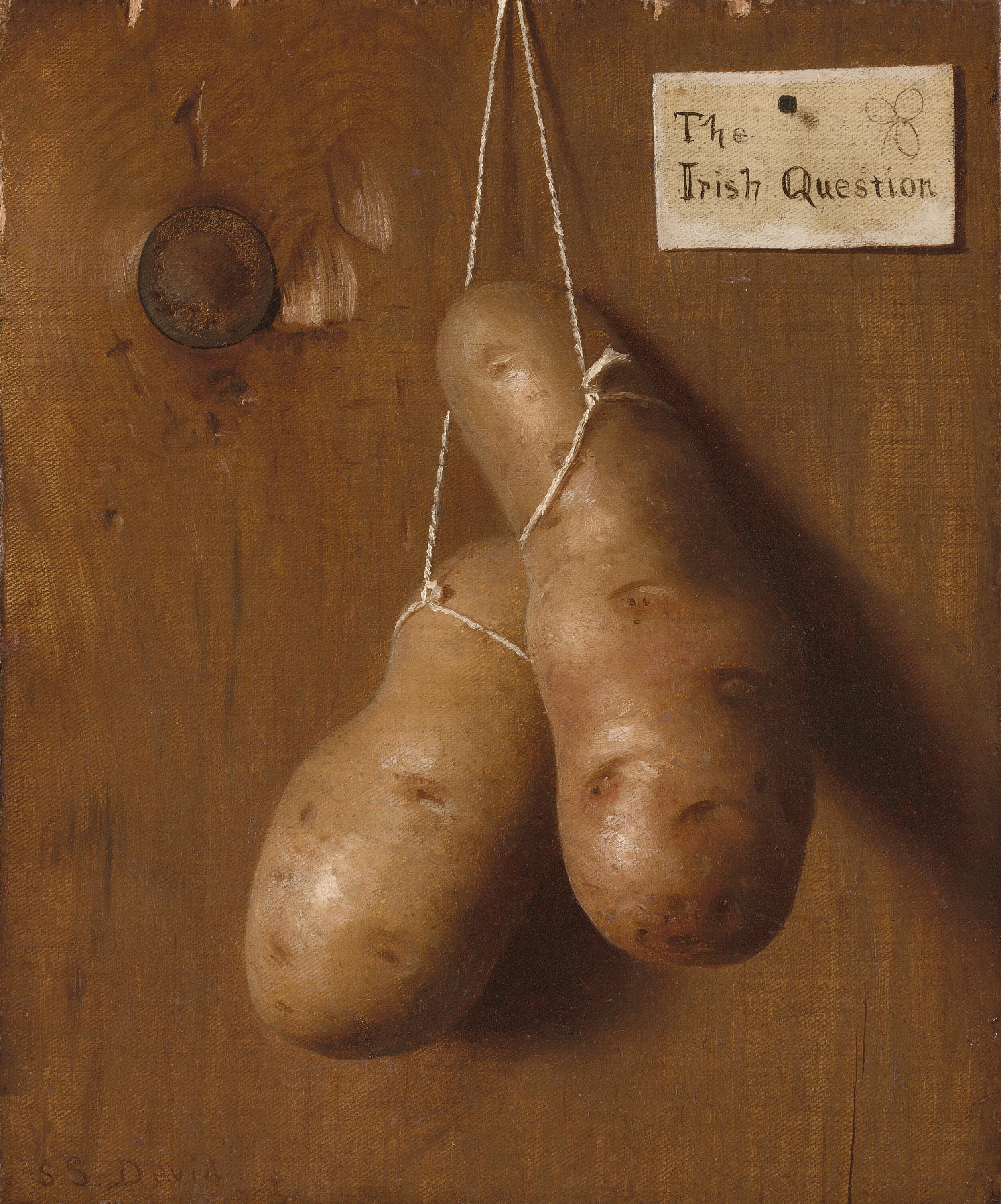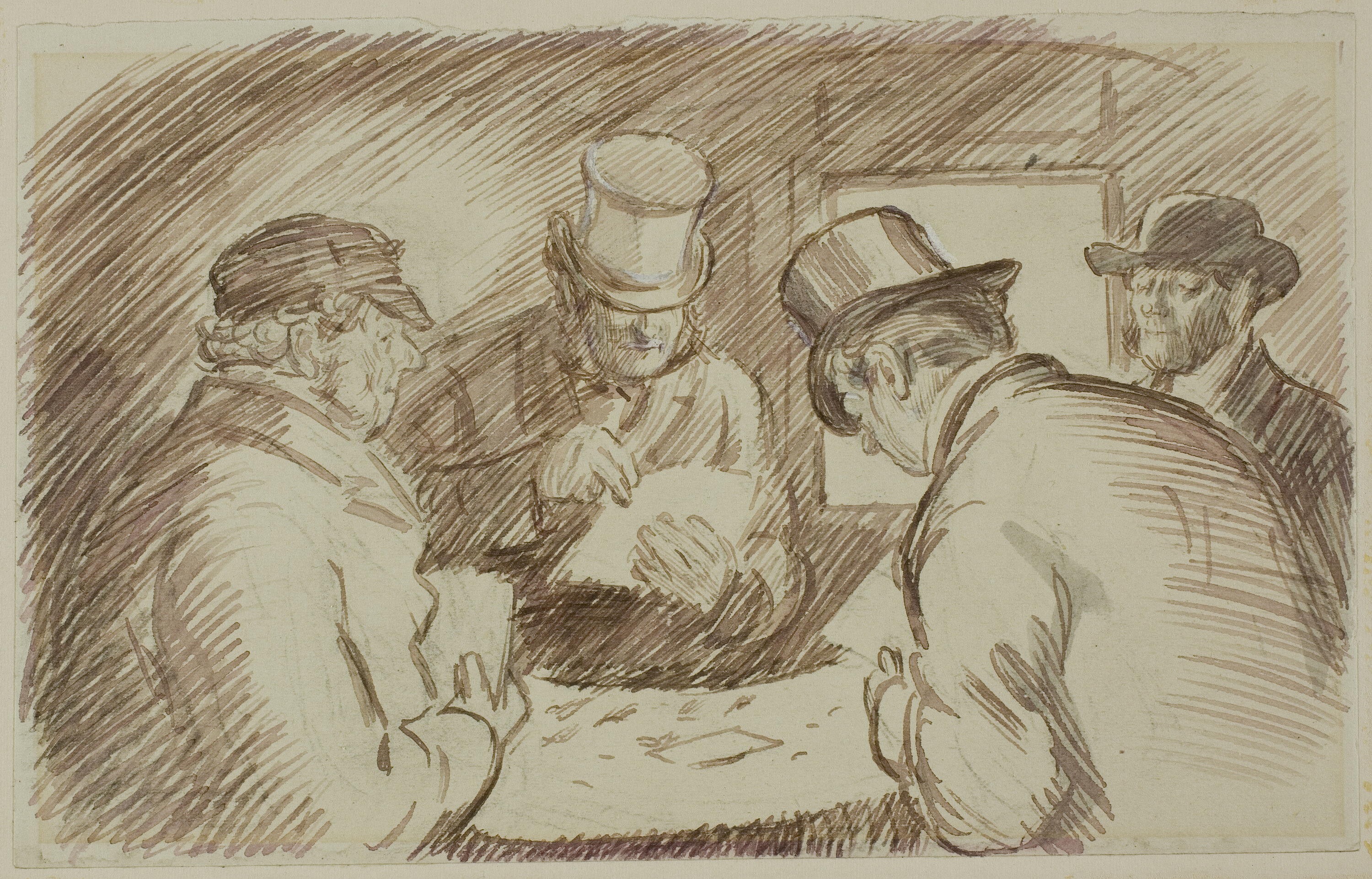Sseccus

Katsukawa Shunsho 勝川 春章:
Man Falling Backward, Startled by a Woman’s Ghost over a River
(c. 1782)
" … because it couldn't."
I came to understand that I previously understood Success backward. It was not as I'd imagined it before I began this dialogue with myself over its nature. I make no firm conclusions, just this observation I must have previously understood backward. I might acknowledge that properly engaged in dialogue often produces this result, which is no conclusive result at all other than to suspect a previous backward understanding. Understanding grew but also created less certainty, an apparent paradox that everyone might notice seems perfectly congruent with their own experience. As a general rule, we do not ever get to the bottom of anything, though we might sometimes misleadingly sense that we're moving in that general direction.
The purpose of dialogue might just as well be this very outcome.
Futures

Giulio Bonasone, After Giulio Romano:
An Omen of the Future Greatness of Augustus (16th century)
" … we're heading in precisely that direction!"
Optimism seems an intrinsic part of Success. I can't imagine Success without a significant contribution from positive anticipation. The Eeyores of this world can't experience Success, perhaps because their perspective won't allow it to manifest. Those who firmly believe in their own positive potential seem to more comfortably realize some semblance of it. The belief need not necessarily be based upon any verifiable facts and might eventually prove to have been pure fantasy.
Nevertheless, it might still positively contribute to some sense of Success, even if it proves to be less than anticipated.
Pasts

Johann Georg Wille: The Philosopher of the Past (1782)
"It isn't, but was, and promises to one day be before slipping behind me again."
I often imagine my Successes as assets, like coins stored in a bank, except I know there’s no bank there. I remember high points, but I must admit that I do not reside near them. Instead, they belong to my Pasts, the many and various people I've been and places I've inhabited. Each Success seems forever tied to the particular place and time in which it occurred, and though I sometimes think of them as tangible possessions, I understand that they are not and never were. Instead, they exist as memories, which seem tricky characters sometimes capable of appearing real, as if they are living in this present moment rather than suspended somewhere before.
Each of my careers experienced some Successes.
Grudgements

Jacob Duck:
Salome with the Head of Saint John the Baptist
(mid-1600s)
" … steal every possibility for achieving Success"
I possess no foolproof method for attracting Success, just the collected anecdotes included in this almost-finished series. These, distilled together, would not render much of a magic potion, and I did not intend to write a how-do, Do-In-Yourself series on attracting Success. Success never was a commodity to be traded and conjured but more of an ecosystem of experiences, emotions, knowledge, and actions. Attracting Success seems a fool's mission, but not quite so success’s opposite. I believe that the least of us can reliably chase away Success, and often without even thinking very hard, probably usually without thinking at all. One element seems to undermine Success wherever and whenever it occurs, and that element seems to be Grudgement. Carrying a grudge naturally chases most of the positive energy out of the vehicle and renders the driver its slave. Holding a grudge seems the surest way to ensure that Success stays just as far away as possible.
I present as evidence our most recent former President, who still hasn't conceded his most recent defeat even while claiming to be running for a repeat performance.
TimePassing

Claude Monet: Cliff Walk at Pourville (1882)
"Everything was different after that."
Success and failure seem every bit as mercurial as time, for the mere passage of time seems capable of utterly changing either's nature. An apparent failure can become an evident Success when seen through the long-ish shadow of additional experience. Events that seemed apparent Successes in the moment they occurred can erode themselves into even more apparent failures later. TimePassing seems capable of utterly reversing almost any experience, of turning pretty much any event into its opposite. There's real wisdom in the advice to sit on or with a failure before wallowing in it, for The Gods, or somebody, remain capable of fiddling with events, reversing their nature. A stumble might enable a better rhythm to emerge later.
I'm sure that we all have our stories of catastrophes narrowly averted by what, at the moment, appeared to have been a serious setback of fortunes.
Puzzlements

Okumura Masanobu:
Solving a Puzzle (n.d., circa 1700-1760s)
" … no more often than occasionally, please."
When the annual New Yorker Puzzle Edition arrives, I resign myself to missing my usual reading material that week. I won't even look at the offered puzzles because they have always just confused me. Likewise, I hop over the New York Times crossword puzzle page. I find puzzles puzzling rather than entertaining. I consider those who dedicate themselves to Wordle, whatever that is, unfortunate. The Muse is forever playing solitaire or something on her phone. I find even the mention of card games boring. I will not submit to playing board games, either, with the very occasional exception of Scrabble. I find board games aptly named in that they seem boring. Given a choice between sitting quietly in some corner and solving a puzzle, I'll choose sitting quietly in some corner fifty times out of twenty.
I admit that Success sometimes demands that I solve some genuine Puzzlement.
|Success|

Claude Monet:
The Departure of the Boats, Étretat (1885)
" … my purpose must be clear,
for it is always and without exception,
what my actions manifest here."
I think of Success and failure as positive and negative arcs on the same old number line, with Successes progressing outward to the right of the midpoint and failures fading outward to the left. Both great Success and great failure can be represented there by their distance from the center. Some Successes don't really amount to much, less than ten on an infinite scale, while others loop off into the far, far distance. Same story with failures, though their emotional content leans toward the sorrowful rather than the joyful. Each point on both sides denotes some emotional range, from minor to great, and therefore might qualify for assessment as absolute values rather than as opposites. Yes, sadness differs in content while similar in strength. A ten on either pole might then be considered roughly equal in scope, though opposite in emotional texture.
I bring up this admittedly arcane point for a potentially practical reason.
AbjectSuccess

Walter Crane: King Midas with his daughter,
from Nathaniel Hawthorne's 1893 edition of
A Wonder-Book for Girls and Boys (1893)
"The absence of its opposite …"
Midas stands as the archetypal embodiment of a specific sort of Success none of us hope to achieve. To at least try to be honest, his error seems innocent enough. He had not thought his greed to or through its logical extents. He overreached. Each of us has just as innocently stepped over some similarly unseen edge, if only when gorging at a holiday table. We celebrate our great Success, only to render ourselves miserable as a result. Too much of some good things seem worse than the worst of all possible outcomes. Midas sought a magic touch such that everything he touched might turn to gold. Granted that short-sighted wish, he found himself unable to eat or drink and, when he touched his beloved daughter, Abjectly Successful.
I suspect that each of us holds this capacity.
Hackcess

Pierre-Auguste Renoir: Self-Portrait (1876)
"Hackcess ever only happens once …"
I admit that I've mostly lived outside the boundaries of propriety. I didn't seek an advanced degree before practicing my professions but made up my approaches as I went along. I experienced at least my fair share of Success, but perhaps by unfair means. I dropped out of my high school typing class rather than flunk it, but I still went on to become a best-selling author, though I'm still an absolute hack typist. I present my two and a half typing fingers as prima facie evidence, along with my bestseller and the second dozen manuscripts I will have finished by this Summer's solstice. I garden, but not according to anyone's rules, not even my own, since I seem to continue making up my practice as I go along. I'm always learning but never learnéd. Forever the hacker.
One way to most reliably fail seems to me to be to hold oneself to someone else's recipe, the way things are supposed to be done.
ThePrice

Honoré Victorin Daumier:
The Print Collector (c. 1857/63)
"Success seems priceless"
The cost of Success might eventually come into question. The underlying idea being that the value of the Success should stand in excess of the price and that Successful action should properly show a profit rather than a loss. Upon reflection, this sort of cost accounting should seem spurious since it employs less than uniform units. How might one assess value, and on what basis? Likewise, how might one reasonably account for profit and, again, using which values? Scrutiny should properly find the whole effort spurious, if not entirely worthless. Few of us won't catch ourselves attempting to complete such an assessment, though, us having been reared within a capitalist system. We were raised to produce profit and loss statements.
When it comes to Success, though, we might prefer to cipher in units of happiness or joy.
TrueConfessions

Alfred Stieglitz: Dorothy True (1919)
"I must tell my stories or else …"
It's always seemed unlikely to me that I might ever Successfully meet any challenge. I tend to start with a glass already half empty or, more often, no glass at all with which to address the challenge. I eventually discovered my adequacies lurking in eternally unexpected places and that I almost always proved capable of Success, however impossible it had earlier seemed. I suspect a lesson lurking to be discovered in there, but I hope it's not an obvious one. I despise finding out that I've been seeing right through some prominent something, the last one in the room to finally acknowledge what everyone else long ago perceived. It peeves me. It might be true, though, that I was never nearly as inadequate as I felt. I could have always interpreted those sensations as representing something else besides my inadequacies, whatever that might have been. I might have always actually been more than adequate without hardly ever feeling as though I was.
I am learning that confessing really does clean up the spirit.
Starting

Hans Kleiber: Starting on the Hunt (20th century)
" … much, much, much better at it than I've ever been."
I think of Success as necessarily tied to completing something, but its natural antecedent lies in Starting something. I can become an enthusiastic finisher once some pattern of execution settles in, but Starting seems to be my nemesis. I do not easily get moving in any direction, regardless of how alluring any impending Success might seem. Until I've found some rhythm and anticipatable pattern, each opportunity just seems like another unopened can of worms offering otherwise unnecessary complications. These complications might always be necessary, little dedication tests left expressly for my challenge, for if I cannot get myself Starting, I'll never propel myself into any Success.
I search for a handhold, someplace to start, for each effort seems first a smooth, blank wall.
QuestioningDichotomies

De Scott Evans: The Irish Question (1880s)
"We all know what happens then."
A decent inquiry seems to follow a predictable trajectory. It begins by making some clear distinctions and defining its territory. Later, this initiating dichotomy starts breaking down as the earlier clear distinction starts evaporating, first a little, and later, a lot. By the end of the investigation, the initial distinction should have almost completely fallen apart such that the beginning arguments might seem utter nonsense, the subject having been rendered nearly absurd by then. Like this series, started in relative innocence, into the nature of Success, I have grown to question my founding premise. I no longer believe in Success as I once presumed it existed. I've reached no definitive conclusion, which is also typical of any genuine investigation. Our expectations might have been utterly poisoned by our too-close exposures to crime fiction, where endings bring resolutions. The real world deals more in enlightening confusions.
It might just be that all dichotomies must ultimately prove to have been fictions.
SuccessDelayed

Peter Paul Rubens:
The Voyage of the Cardinal Infante Ferdinand of Spain from Barcelona to Genoa in April 1633, with Neptune Calming the Tempest, Alternate Title: Quos Ego (1635)
"I revel most in those long-delayed Successes!"
Some messes prove difficult to resolve. I do not know why. The pile of boxes accumulating in the basement dated from a year ago last Christmas, if my forensic flattening figured out anything. Finally, yesterday, I tore into that mess and resolved it in something under an hour. I loaded up Elizabeth, our Lexus pick-up truck stand-in, and The Muse and I performed a royal procession to the cardboard recycling station at the local landfill. We were filled with a deep sense of genuine accomplishment, a feeling far greater and more rewarding than could have ever come from routinely dealing with those boxes as they'd come. That pile of boxes, long a source of quiet disgust, held great potential to produce tremendous satisfaction, but only after it had been liberally marinated in fifteen months of my most dedicatedly degrading procrastination.
Those months of quiet disgust at just how slovenly I'd been turned into the most extraordinary sensation of Success I'd felt since before last Christmas.
Nullness

Thomas Wright:
An original theory or new hypothesis of the universe
(1750)
"Success often resides in no result."
Determining when something's working can prove damnably difficult. Over many years, scientists have devised counter-intuitive methods for better bulletproofing their assertions. Prominent among them must be The Null Hypothesis. This convention turns inquiry on its head because instead of presuming effectiveness, i.e., something's different, it presumes no change at all, or no significant change. Success under this arrangement must be inferred because it might not prove directly observable. We can see what isn't much easier than we might see what might be there. This convention leads scientists to produce different conclusions than those made by the typical layperson, even one armed with connection to The Internets, because the layperson tends to ask the wrong sorts of questions.
Search, for instance, isn't very closely correlated with research.
Judge

William Blake: God Judging Adam (ca. 1795)
" … exclusively reserved for my inner masochist."
Who judges Successes and failures? For me, most of the time, it's nobody but me. This assertion makes sense since nobody but I witnesses most of what I do. I am usually the only witness to my actions. Only a select few of my engagements ever prove witnessable because most of them occur entirely, or mostly, in my head. A few busybodies with nothing better to do might be snooping over the back fence, but nobody really cares about their judgments, so they make lousy Judges, anyway. The ever-feared Court Of Public Opinion might render the occasional decision, too, but only the upwardly mobile ever really care to seek their opinion. Bosses, spouses, and police forces each seem inattentive compared to my primary Judges: me, myself, and I.
I sometimes wonder why I ever subject myself to harsh judgment.
SelfSaboteur

Jean-Siméon Chardin:
Self-Portrait with a Visor (c. 1776)
" … my fair share of nothing much at all."
However Successful I might have otherwise become, I might always remain most Successful as a SelfSaboteur. I undermine my intentions in at least ten thousand shifting ways, rarely precisely the same way twice. I head myself off and detour my own progress. I discourage myself like a master chef fillets a salmon, one clean cut, and my courage pulls free, leaving exposed flesh. I can be critical. I become distracted. I shift my priorities so my heart's most fervent desire can't find itself on my schedule. I fritter most mornings away. I go to bed early and rise even earlier until I swear I can find no time to accomplish anything. Most of my life has always seemed to be pending, idling, waiting for something. In all these things and many more, I count myself most Successful.
Success, though, real Success hardly requires much excess time or talent.
FeyLure

Hieronymus Wierix, after Ambrosius Francken:
Volwassenheid [Maturity] (1563 - 1584)
" … our world seems much more Successful for our forebears' fumbled passes."
My parents' generation matriculated in the school of hard knocks. Their elementary education, such as it was, occurred through the depths of The Great Depression. They came of age into a world at war with itself, where the battle between good and evil actually killed their cousins. As a result, they were traumatized and paranoid adults, easy prey for the day’s propaganda. They saluted the flag or else. They devoutly opposed everything Communist. They voted the straight Republican ticket because Eisenhower embodied the victory over evil in this world. They tried and gratefully failed to instill their worldview into their children.
It has always been thus, parents failing to fully enlist their offspring into the trauma that fashioned their adulthood.
AlsoRan

Charles François Daubigny: The Dray Horses (1850)
"Such is the eventual nature of continual competition …"
Every horse race features a winner along with a second and third-place finisher, losers, but still paying off some bettors. The balance of the field AlsoRan, but ran out of any money. These animals lost the race. They aren't even really considered contenders. Their statistics will reflect this disappointing outing. Some of this crowd, for it comprises the majority of the entries, will be on their way up, destined for better, while others experience another step on a long and inexorable slide. It might be that the majority of every field—the entrants in every race—contribute nothing more than contextual significance. They were never destined to win, more destined to lose or not really compete, certainly never competing in the way that the reliable winners might. They could be counted as present but without distinction. They showed up without showing.
This AlsoRan state describes me most of the time.
HasBeen

Hendrick Goltzius: Gillis van Breen (1588/92)
" … the most Successful HasBeen I can remember."
No inquiry into Success could be considered complete without at least mentioning the HasBeen. The HasBeen might have once held high office, but no longer. His legend's much more potent than his presence. He once was but is no longer. In government service, a protocol insists that anyone retired shall forever be acknowledged by the honorific appropriate to the highest office they held. A former President shall be forever referred to as Mr. President, even though he might have also once been a dog catcher or a Senator. Ambassadors might come a dime a dozen, but nobody outlives that designation. There's just no living down some things. Those of us who never served in government might struggle to identify the highest role we ever fulfilled. Protocol remains mute on whether it's appropriate to refer to an ex-Data Analyst II's most elevated position when acknowledging them or if the less noteworthy titles defer to Mr. or Ms. However, this suggestion backs up to treacherous pronoun territory, which should be avoided under every possible condition.
One ages into a HasBeen without volition.
Begrudging

Pieter van der Borcht:
Christus in het huis van Martha en Maria
[Christ in the house of Martha and Mary] (1555-1608)
"Success brings no wisdom."
Begrudging seems the least likely side effect of Success, yet billionaires everywhere seem to have become full-time disgruntled social commentators. I would have thought that a billion bought a certain sustainable level of satisfaction, but I would have apparently been wrong and not a little wrong. Indeed, the very rich and (if only by implication, then) the very Successful seem to have been grievously wounded on their way up through the ranks. Not even those homes located in fabulous places or their super yachts or private airliners serve to salve those festering wounds, which appear to have become incapable of ever healing. Some spend lavishly churning up the rabble, funding propaganda campaigns and think tanks so well endowed that they never have to resort to actually thinking. Begrudging might seem beneath them, but it turns out to be their purpose instead.
Why, I wonder, do so many of the uber-successful consider themselves radical conservatives?
Levitating

Lucian and Mary Brown:
Untitled [child floating in water] (c. 1950)
" … and it's "just" a feeling."
The Successful seem subject to overall less gravity weighing down their lives. They seem to Levitate above many of the most common human concerns. While I'm almost certain they are subjected to precisely the same gravitational forces the rest of us carry, those forces seem to affect the Successful differently. They seem less a burden, less encumbering as if they possessed their gravity rather than gravity possessing—owning—them. The unsuccessful seem like some onerous forces owned them, invisible yet seemingly inescapable. Maybe just an attitude distinguishes one from the other. If so, that difference sure seems to make a huge difference. They've always insisted that success breeds success, but it does more than that. It's like Success bestows a higher rate of return. The Successful seem to earn more than their more disappointed counterparts for the same amount of effort. Life does not seem to get them in the same way it gets others.
The Successful seem to age more slowly.
-itating

Torii Kiyonobu II:
A Priest Sweeping in the Snow (1731)
" … sweeping that floor that never needed sweeping."
If you or I were to run off to a monastery to seek enlightenment, upon arrival, the Master would undoubtedly assign us some seemingly menial task and solemnly declare that work our chief responsibility. Basically, these assignments usually amount to sweeping floors that apparently do not need sweeping. If we find ourselves bored and go back to the Master seeking some more challenging assignment, our request would most certainly be rebuffed. Instead, we would be told to stick to the given job. Eventually, we might discover the more profound significance of our job that does not need doing, that we were not so much sweeping some floor that didn't need sweeping, but we were -itating instead, in this instance, med-itating.
Whether iterated sweeping floors that don't need sweeping necessarily leads to enlightenment isn't for me to say.
Chimera

Gustave Moreau: The Chimera (1867)
" … just wait a minute and see what's served up next."
I suspect that the subject of any inquiry might eventually come to lose its initial identity. What began almost pristine in its innate separateness eventually faded into a seemingly self-sameness with its surroundings, to the point that it might have just disappeared. What was once such a specialized focus evolved to involve pretty much everything else. Try though he might, the investigator would find himself unable to segregate his inquiry into ever sharper foci, for the more he'd come to know his subject, the more it might well seem universal. Success, for instance, my focus these past two months, has expanded far beyond what I initially presumed might be its reasonable territory. I'm coming to believe that I could consider anything—any idea, any object, any emotion—in the light of Success and find that idea, object, or feeling, somehow another integral part of it. This inquisitor's moved to wonder if this effect amounts to enlightenment because it seems quite the opposite. Is endarkenment even a term?
The naive separation into individual pieces seems a reasonable enough starting point.
DeepMystery

Gustave Moreau: Hercules and the Lernaean Hydra
(1875/76)
"Success often seems a stranger to me."
I hold many things to be DeepMysteries to the point that I, like everybody, believe myself unique—and not in any particularly good way. My DeepMysteries prevent me from engaging with this world as I imagine that I might, had I proven myself capable of resolving these DeepMysteries. These irresolutions do not really affect significant situations, just minor ones, making them even more insidious in most ways. I’m often stymied by some innocuous door handle or, even more often, by packaging. I cannot get to the product inside, thanks to the paranoid-level security system wrapped around the thing, which sits there so innocently within its perfectly transparent yet utterly impenetrable outer shell. I usually call for The Muse to help since such things only very rarely stymie her. She seems to be able to quickly, even preconsciously, slip through barriers I cannot penetrate under any condition.
I purchased an industrial-sized package of dishwashing detergent this week.
Ex-Success

Peter James Studio: Untitled
[man posing with "success" poster] (1952)
"Success only exists in past tenses …"
How long might a Success last? Some seem genuinely eternal, while others quickly evaporate. We celebrate some Successes forever. Christmas, the celebration of light Succeeding over darkness, comes to mind. When the home team wins the pennant, it seems in that minute as if every fan in those stands has experienced something genuinely eternal, yet two short seasons later, those once heroes have become a gang of bums again, spoken of derisively by the delicatessen counterman. Most Success seems alarmingly fleeting, however peaky the initial experience. Repeat the story enough times, and even the hero would really rather forget that journey. After a point, it turns into nostalgia which no amount of retelling could ever reincarnate.
I carry my standard packet of Success stories.
Fuccess

Franz von Stuck: Wounded Amazon (1905)
"I'll never erase those debts my Fuccesses inflicted …"
I speak today of Success that feels like failure, the advancing through terrifying turbulence, the wounding of the enthusiastic optimist. We've all been through this, where the cost of advancement hardly seems worth the effort, though we convince ourselves that it probably will be, eventually, even if it doesn't feel worth it that day. Success can be a terrible taskmaster, demanding much more than we would have willingly invested when we started, but often no more than we'd enthusiastically part with under coercion, as necessary to turn off the punishment or nudge us across some promising finish line. We imagine the expense worth it, though validation of that presumption usually has to come later. We might always carry the scar of that Success, for that wound might have made all the difference, a debt carried forward, a down payment never actually repaid. Sometimes Success changes more than one's fortune.
One might learn to approach each opportunity warily as if Success features teeth and claws once it has wounded.
Method

Albrecht Dürer: Tekenaar tekent een luit
[Draftsman Draws A Lute] (1525)
" … perhaps they're necessary, …"
Method might be necessary but never sufficient. The baker needs much more than a recipe to Succeed. So does everybody, yet the trainers invariably start by sharing recipes. They possess a "methodology,” and they promote it just as if it could contain baking's Gestalt, its practice. I suppose that teachers have to start somewhere, and wherever they begin just must prove inadequate to describe the complexities of the practice. Still, even the canny apprentice tends to imprint upon the recipe, their earliest introduction, as somehow emblematic of their practice, when it's just at best necessary but always, always, always inadequate, just like any entrance isn't the contents.
The recipes for Success seem numerous.
Stinginess

Juste de Juste: Pyramid of Five Men (c. 1543)
"Those who share the most toys, never really die."
Stinginess seems to have always been one of the more reliable indicators of Success. The Successful seem to become Scrooges while the more humbled remain generous Jacob Marleys. This apparent paradox, where those most able to afford, dedicate themselves to hoarding rather than sharing, has become the very foundation of modern economics, where, even more than in ancient and even antebellum times, wealth flows upward toward those least in need of it and away from those most struggling to supply it. The whole system seems some combination of heartless and needless, unnecessary, one of those anomalies we should have collectively figured out how to resolve, but we have not. Instead, we seem to be sliding even further from resolution.
I've never understood why any sentient employer would fight their employees forming a union.
Impostoring

Suzuki Harunobu: The Face in the Mirror (1766)
"… must be merely hollow inside."
It would surprise nobody to learn that virtually everybody engages in Impostoring, though there seem to be varying grades of individual mastery. Some practitioners work like ventriloquists, never moving lips or larynx, while others perform like the four-year-old in the family production, exhibiting much more enthusiasm than talent. Fifty years ago, this notion that even the apparently very Successful experience abiding senses of inadequacy was still a closely-held secret. It might have been a prominent presence in even the most Successful's lives, but this had not yet been discovered and named. The pair that discovered and named this condition referred to it not as a syndrome, as it has become popularly known, but as a less dramatic phenomenon. In the years since this eighth sense has taken as prominent a placement as has competence in the skill set of the genuinely Successful. One can hardly Succeed these days without, at some level formally faking the skill.
When I finished my big book, I remarked that it would forever stand as testament to what a sincere lack of faith in my ability can accomplish, for I never once had a sense when creating it that I was crafting anything extraordinary.
Satiability

Honoré Victorin Daumier:
“- Mr. Alfred Cabassol! You are the only one in the class who succeeded
to get through the entire week without blowing your nose into your sleeve.
Please stand to receive this prize of honour for cleanliness,”
plate 6 from Professeurs Et Moutards (1846)
" … moving forward, if not necessarily ahead."
Given the human tendency toward dissatisfaction, I suspect that the average Satiability of the typical Success seeker might be measured in minuscule quantities, hours and days rather than months and years, but I could be wrong. I know, or think I know, that when pursuing Success, I tend to get very single-minded, as if that objective was the whole of my existence and the satisfaction I'll experience will approach infinite. After, and often even just after achieving it, I feel more of an "Oh, Is That All?" sort of sensation before going back into trolling for yet another infinite-seeming satisfaction, which will, of course, fall short of expectation once delivered. Around and around and around, I go. You might go around like this, too.
Some Success seems more sticky.
EmergenceScenes

Rodolphe Bresdin: Biblical Scenes (Not Dated)
" … Successfully seeming so damned ordinary."
What if a writer didn't start with his story's end in mind? What if he considered his art, his calling, to be different from transcription of a cleverly pre-developed plot? What if he never gave plot a single thought but instead considered conveying plot to be an emergent property rather than an underlying purpose of his work? What might result, aside from said writer being rudely thrown out of the fraternity? The result might produce EmergenceScenes, glimpses of what might easily be mistaken for deliberate plot were they not so divergent. After considerable consideration, they might sum to the same thing to produce a certain coherence not evident while the emergence was busy unfolding. Rather than starting with his ending in mind, the creator of EmergentScenes begins with the intention of discovering what might later be mistaken for a plot line. He begins by simply starting with intention.
In our real world, in our lived lives, no clever plotlines exist.
Spot

Gordon W. Gahan: Star's Daughter (Fourth of eleven):
Her favorite spot for studying scripts is the big window sill in her Manhattan apartment. (1964-65)
"My internal state determines my Success …"
I have a Spot, a place where I feel emotionally, psychologically, intellectually, and physically balanced and secure. I do not continuously inhabit this place but seem to be trending toward inhabiting it instead. Some days, I find myself smack dap in the center of it, while on others, I cannot seem to find even its slightest edge. When I stand near the center of this Spot, I feel remarkably powerful and comfortable "in my skin," as the old saying goes. Though not always profoundly, I feel the absence when I’m away from it. I understand I’m more likely to do something short-sighted or stupid when absent. I'm divorced from my very best when I lose my Spot. Losing it serves as grounds for serious searching, and often in vain, for I usually prove inept when I've lost my Spot.
My Successes seem strongly correlated with my inhabiting my Spot.
CruelOptimism

Pierre-Paul Prud'hon:
Le Cruel rit des pleurs qu'il fait verser
[The Cruel One Laughs at the Tears Which It Causes To Be Shed]
(1793)
" … getting better and better!"
Novelist and radio personality Garrison Keillor described his fictional Minnesota town of Lake Woebegone as "where all the women are strong, all the men are good-looking, and all the children are above average." Nobody needs me to tell them that in no population do all the members measure above average for anything. We have all been schooled in proper comportment, at least to the extent that we understand that a passing question like, "How are you?" must be responded to in the positive: "Fine, thanks. You?" Our response might qualify as pure fiction, but then so was the question, for it was a mere acknowledgment of presence and never intended to encourage disclosure. Societies depend upon such understandings.
Last night I began reading a book that I'm sure I will never finish.
Style

Dominicus Custos:
A Grotesque Head with a Helmet in the Style of Arcimboldo (1594)
" … a nearly sacred responsibility to judge my own behavior …"
I yesterday experienced an existential crisis. I encountered another dark side of Success, the idea that it might be all about competing. I felt as though I'd fallen into an inescapable pit, like I'd made a poor, perhaps even hasty, choice when selecting Success as my focus for a series. As with any existential crisis, I was blinded by insight and could not see beyond it. I scratched a barely legible note on my cell wall and moved on into my day, feeling supremely disappointed in myself. I sank into a bout of self-pity from which I figure I might one day recover. My realization shook me to my core. My inquiry into Success had produced an overwhelming feeling of failure, for I had not intended and never wanted to cast myself as a competitor. I consider competition a serious illness best treated by refusing to engage. I'd imagined that Success might be managed as something other than competition. I still believe this must be possible.
I could take each of the seven deadly sins and expose each as a primary means for achieving Success.
Complitition

Édouard Manet:
Beggar with a Duffle Coat [Philosopher] (1865/67)
" … might be an improvement."
I tried to imagine Success as something other than a result of some kind of competition. I failed.
I tried to imagine Success as something independent from winning or losing.
T/MakingStock

Berthe Morisot: Woman at Her Toilette (1875/80)
"Progress never was my most important product."
Checking progress has always been the great enemy of progress, for those focused upon making progress can barely bear to slow down, let alone stop, to TakeStock. My old friend Norm Kerth wrote a definitive book about this dilemma, reframing the stock-taking into more of a stock-making, transforming the drudge into celebration, but the connotation was never completely removed. TakingStock does not seem like a productive activity, and to those focused on making progress, it's probably always destined to seem like a relative waste of time. It might mostly be a waste of time.
About every month, I finally get fed up with the lack of space in my freezer and clean out the sucker.
Fear

Walter Gramatté: Die Grosse Angst [The Great Fear] (1918)
I Fear Success. I suppose I am not alone in my feelings toward it, even though anyone might argue that Fear hardly qualifies as a rational response to the threat of Success. (Yea, Success seems threatening to me!) Like all feelings, fear was never supposed to follow any rational ideal. Like all emotions, it visits on its own schedule, for its own mysterious reasons, and remains fundamentally non-rational. My job seems to be to figure out how to cope with Fear's appearances.
Success seems as though it might well complicate more than improve.
AmplifiedReflective

Arnold Böcklin: In the Sea (1883)
"Successful beneficiaries …"
Years ago, The Muse returned from a workshop with a fresh term. I sincerely appreciate The Muse's willingness to subject herself to workshops since that urge helps me acquire fresh perspectives I'd never willingly seek by signing up for a workshop for myself. I gain much vicariously that I steadfastly refuse to receive the old-fashioned way. I used to teach workshops, but I can't imagine a situation where I would agree to submit to one myself. I correctly fear all forms of education, and not only because I tend to test poorly, though I do tend to test very poorly, a condition that a lifetime of training has failed to improve. Altogether too much emphasis exists to prove that students were paying attention and that they've managed to retain what might have never stuck. The purpose of education was never validation, but try telling that to a system trying to justify its existence.
The term The Muse dragged home was AmplifiedReflective, which I instantly recognized as perfectly formed.
Nuthin

Pieter Symonsz Potter: Vanitas Still Life (1646)
"Nuthin' might serve as a perfectly satisfactory purpose …"
Of all that anyone might Successfully achieve, Nuthin' ranks near the top of the Most Difficult List. The difficulty seems to be the doing. Nuthin' requires nothing, and plenty of it, generously spread over time, and something about time naturally repels Nuthin' like oil on water. A few minutes into the effort, the monkey mind takes over and starts casting thoughts out into the ether, where they try to take root. Even that simple, nearly non-action amounts to something, the opposite of the intended Nuthin’. Even if the monkey mind doesn't derail the initiative, boredom might doom the effort by driving the incumbent into something, however well-intended the effort at accomplishing Nuthin'. It's hard work, perhaps the hardest.
The Muse continues healing from her throat cancer, the primary treatment for which she finished three months ago.
Proximity

Albrecht Dürer:
The Prodigal Son Amid the Swine (c. 1496)
" … a flow wherein the sense seems to come and go …"
They insist that misery loves company. It might be that every state aches for its similars such that any emotion promotes more of itself; any perspective creates the context for self-preservation and replication. Success seems to crave company, too. Perhaps the best preparation for any Success might come from merely placing one's self in close Proximity to some Success, be that person, place, or thing. Hang out with Successful people, and I might find myself infected with something akin to Success germs, so I might have little choice about whether to feel Successful. It "just" happens. Hang out in a place known as a Success and feel how deep an influence that place seems to exert. Our Successful remodel rendered our modest villa into a relative palace. We live like royalty as a result.
This simple principle justifies a certain discernment and careful judgment when choosing anything.
SuperBorsolino

Gordon W. Gahan:
Untitled [man in white shirt and fedora] (1965-1968)
" … clearly styling."
Success seems to attract symbols of its presence, none more prominent, I suspect, than wardrobe. We 'dress for success,' as if our manner of dress would quite reasonably attract Success to us, and I suppose that this practice even works, after a fashion. I know I subscribed to 'dress for success' magical thinking during my tenure at The Insurance Company. I'd carefully shop the sale racks at the "better" haberdashers and spend every Sunday evening ironing my week's shirts, heavy on the starch. I arrived at the office each morning in costume and ready to perform the role of an up-and-comer, poised to impress myself, if nobody else. And I suppose those strange attractors worked, more or less, for my fortunes steadily rose there, and that Success could not possibly have been related to any particular talent I possessed. I might as well blame that Success on the vests.
Others possess lucky underpants, socks, and tee shirts; some even carry a "lucky" rabbit's foot on their keychain.
Askemption

Isoda Koryusai:
Girl Playing a Prank on a Young Man who is Napping (c. 1769)
"It must have just happened just because."
I do not consider myself incurious, yet I frequently squelch one line of inquiry. I might, with genuine curiosity, ask the usual who?, what?, and when? before squelching on the why?. I do this because I long ago decided that why? serves severely limited utility and mostly fails to rise up to within the range of a necessary question and worse, why? most often proves to be an absolute barrier to resolution. In those rare instances where my personal motivation might come into question and where I'm the one expected to perform the answering, why? seems an entirely unremarkable question, but these conditions rarely reign. More often, the situation involves another's presumed motivation coming into question, or worse, a chain of presumed motivations shared between a string of actors, none of whom seem available for cross-examination. Then, I can only deepen the mystery by asking why? questions. Insisting upon answers from an apparently indifferent universe seems as though it could only ever make matters worse. I try to remember to cease and desist then and grant myself an Askemption.
Success often stands beyond closure.
Approval

Gabriël Metsu: The Herring-Seller (c. 1661 - 62)
" … rendering the whole system suicidally cynical."
By the end of his second year in office, President Joe Biden could tout one of the most successful administrations in the history of his country. On nearly every scale, he had prevailed in fixing, improving, resolving, and minimizing serious problems and longer-term inequities. Moreover, despite a cruelly opposing Senate majority, he prevailed, probably due to his superior understanding of how his government worked and in no small part due to the utter ineptness of his predecessor, who, in stark contrast with Biden's administration, produced a succession of absolute disasters. Still, Biden's Approval rating hovered around forty percent.
The previous incumbent's Approval had ranged as low as the low twenties.
Austerity

Edgar Degas: Breakfast after the Bath (1895/98)
" … only investing in the future could move us there."
Our siblings in Great Britain suffer from decades of foolish leadership, effects we've barely sidestepped ourselves. After Reagan's disastrous economic strategies failed, along with his ally Margaret Thatcher's, a succession of Repuglican politicians continued hammering the same senseless drumbeat, warning of dire consequences for our children and our grandchildren should we not invoke deep spending cuts and agree to subject ourselves to an indefinite period of Austerity. They insisted that we could starve our way to prosperity, an absurd yet strangely popular strategy, albeit one that steadfastly ignored overwhelming evidence to the contrary. We were never in great danger of smothering ourselves with our spending. Quite the opposite! After forty years of dire warnings, our debt service remains a most modest, just under two percent of GDP, the envy of pretty much everybody else in the world.
The chorus continues in even greater earnestness.
Edgercating

Lucian and Mary Brown: Untitled
[children in classroom looking at globe] (circa 1950)
"I still haunt my own periphery …"
I suspect that we all received a somewhat different than a standard education. I certainly did. Rather than advance directly to college after high school, passing Go and collecting the obligatory two hundred dollars, I entered a kind of Limbo, where for a year or so, I was neither here nor anywhere, really. I enrolled in the local community college, which I called the high school with ashtrays, and set about trying to avoid getting drafted. I never really suspected it at the time, but I was receiving an exquisite education, albeit from around the edges. I would receive no advanced degree in observational methodologies, just one Hell of a lot of practice in the field. I might not have been formally enrolled in one of the finest universities, but I was nonetheless receiving the highest quality instruction, personally curating content as well as instructors.
Within a year, I'd followed the woman who would later become my first wife back to her shared apartment in Seattle's U District, for she was formally enrolled in a genuine University.
BlowingItUp

Théophile-Alexandre Steinlen: Truth and the Two Soldiers (1891)
"Blowing It Up Better."
I consider it perfectly normal to start off in the wrong direction. We are after all, humans, and humans have always excelled at heading off in some wrong direction, often for the very best of reasons. Anyone, at any time, remains perfectly capable of making just such a mistake. The only question might be how long it will take before one notices and takes corrective action. Any of an array of familiar responses might emerge whenever a human finally notices their error. (A different set appears when we notice someone else in error.) Some will attempt corrective action, just as if the fix should not require any significant course correction. However, if one's headed in the wrong direction, it might require anything up to and including a one-hundred-and-eighty-degree deflection. I usually manage a fix in more like a dozen similarly wrong-headed attempts to fix.
The issue at hand rarely seems to be a question of intent.
Anticipations

Edouard Manet: Le ballon [The Balloon] 1862
"Who's to say my Anticipations don't create my future?"
Success must surely be at least ninety percent Anticipations. We more often see what we believe than believe what we see. We might be incapable of moving cleanly into any future, each future first manifesting in Anticipations of what might be seen. It might be most common for one to anticipate worse rather than better. I know I usually first feel a foreboding when considering what's coming. That seems to be my default setting. It requires great concentration for me to warmly anticipate any future. I'm more apt to consider its potential shortcomings than in any way expect blessings. I suppose that I might most often manifest something worse than I would have otherwise conjured had I merely anticipated better.
Leading up to a meeting I've been invited to facilitate, I anticipate disaster.
Gatekeeper

Waldemar Franz Herman Titzenthaler:
A soldier of the Prussian guard (1903)
" … one must always serve as their own Gatekeeper first …"
I live in conflict with my beliefs. I suspect that everyone does. Yesterday, I wrote a fine story about how I believe that Gatekeepers surround Success and deny entry to any and all not holding GoldenTickets. As near as I can tell, I've always believed some variant of this story, even though it has rarely held true. While it's true that I have at times benefitted from some Gatekeeper's intervention, it might be equally true that they probably did not command the sole means for my gaining access. Even when a Gatekeeper intervened, I also needed to have intervened on my own behalf at some point. I was never a passive commodity impassively passed but an active entity making my own choices.
It might be true that one must always serve as their own Gatekeeper first, however unlikely this role might seem.
GoldenTicket

Théophile-Alexandre Steinlen: A Veteran of the Old Guard (1915)
"If I could just manage to hold onto those golden tickets …"
I imagine Success to be securely defended territory guarded 24/7 and then some by experienced and deadly serious Gatekeepers. These defenders of the status quo seem to know when something different approaches, and they have their game plan down pat to prevent each and any encroachment. Anyone wishing to enter those Elysian Fields must carry an invitation engraved with their personal information, issued by some duly designated authority. Nobody, and I mean NOBODY, ever gains entrance by accident or solely by their own volition. Each must have gained and been given explicit permission, for access remains exclusively and forever By Invitation Only, no stragglers, gawkers, or mere do-gooders allowed. Success has always been and intends to remain an exclusive club.
At least, that's how I imagine Success.
Rarely

Willem van Mieris: The Raree-show [’t Fraay Curieus] (1718)
" … the sorriest sort of Success."
Something encourages me to distrust anything that continually occurs, especially Successes. Success seems as though it should appear unreliably, Rarely, lest it forfeit its specialness. The magician who reliably delivers flawless performances must travel because no hometown audience would ever tolerate such consistency. No hitter delivers a home run every time they take to the plate. No painter produces endless flawless masterpieces. Flawed production might even be necessary to properly frame the extraordinary. Success seems as though it should be, at best, a rare occurrence.
What of the remaining performances?
2ndOrderSuccess

Lucas Kilian: Second Vision, from Mirrors of the Microcosm (1613)
" … just seem to take care of themselves."
Back in the sixties—fifty years ago—it seemed that almost every new thing came as a spinoff from President Kennedy's mission to send people to the moon and back by the decade’s end. A raft of space-age products resulted. A powdered orangish juice-like drink said to be part of the astronaut's diet emerged on the market and became wildly popular, even though it was clearly inferior to the genuine article. We began living in the future, "tomorrow today," as one multinational corporation labeled the experience. Life then was much more advanced than it seems today, as we basked in the 2ndOrderSuccess emanating from our sacred national undertaking.
2ndOrderSuccess might be best considered as what one gets as a result of achieving a Success.
Paving

Giovanni Fattori:
Small Street on the Outskirts of Florence with Puppy (1870–75)
" … a perfect portrait of Success."
Some of this town's streets resemble abstract art, with tar rather than paint swirled in curious patterns on the road surfaces to seal cracks and blemishes. Other streets have become nothing but patches; asphalt opened to replace sewer lines over time and never properly resealed, delivering bumpy rides. A few streets still feature the odd exposed rails of long-ago streetcar tracks, a feature from a hundred years ago I sure wish would come back complete with rattling cars and a turnaround right beneath my window overlooking the center of the universe. These streets carry more than traffic, for they most prominently carry their history, smooth or bumpy, narrow or wide. I suspect that nobody and nothing ever successfully escapes their history, that it remains terribly present for everybody forever, the past much more than mere prologue but continuing as an inescapable part of the present, perhaps as its personality.
I could watch forever as stone masons work on cobblestone surfaces.
Sexcess

Thomas Couture: The Supper after the Masked Ball (1855)
" … the only option for avoiding the addictions …"
In this culture, my culture, anyone can get addicted to absolutely anything. What was once revered as "the land of the free and the home of the brave" today seems to have increasingly become the land of the spree and the home of the enslaved. Those suffering from Success Addition Disorders (SAD) seem to be among the most troubled class, for they turn their colossal successes into abject failures. We see evidence of their influence in the tatters of the present Republican Party, a party once dedicated to promoting equality and now obsessed with just avoiding taxes. As with any negative target, and doubly true with any obsession, focusing upon avoiding anything tends to attract precisely what one seeks to avoid, that, or a deeply ingrained paranoia. Today's Success addicted, those suffering from Sexcess, exhibit all the usual symptoms of any full-blown addiction, with the added affliction that they're the most conspicuous consumers, almost as if they're proud of themselves. Don't let their gyrations confuse you. They're ill and suffering, stinking rich!
Dissatisfied with simply spending their fortunes, they employ themselves in the more dubious professions, focusing upon wealth defenses, primarily through concocting fresh schemes to avoid taxes but also extending into funding hyper-conservative pseudo-political movements.
Vortices

Claude Monet: The Departure of the Boats, Étretat (1885)
"Success emerges from such turbulence."
Time moves irregularly. This fundamental law of the universe might have been lost on physicists but not once on the rest of us, for we daily struggle to cope with time's inherent variety. Days, even those that measure of equal length, pass differently, with wide variations apparent if not always precisely measurable. Even calendars remain steadfastly unequal, with January days typically at least forty percent longer than June's or July's.
Attempts to rectify this obvious imbalance have so far resulted in worse, like the French Revolutionary Calendar featuring
Grasp

Jean-Auguste-Dominique Ingres:
Studies for "The Martyrdom of Saint Symphorien"
[Saint, Mother, and Proconsul] (1833)
" … a genuine symbol of that abstract Success."
We humans easily become attracted to abstract concepts, for they seem to be the brightest, shiniest objects distracting our focus. Napoleon insisted that men would only fight to the death for the more abstract concepts if first outfitted with colorful sashes and flashy uniforms. The unscrupulous promote an undefined patriotism and an undefinable faith to attract followers and encourage passionate responses. Only the very highest ideals seem capable of fueling the most degrading engagements. We might claim to want tangible goals, but our behaviors strongly suggest that we really desire the opposite. Running a flag up a flagpole inspires more passion than any dozen well-reasoned treatises.
These strange attractors carry one thing in common.
Reach

Alexandre Cabanel: Woman Reaching Over a Wall,
study for The Life of Saint Louis, King of France (1878)
"Reaching for the occasional impossible …"
The Muse and I differ in significant ways. I'm by far the more delicate of the two flowers. She's one tough cookie. She's more likely to dream big. Her grasp often seems to exceed her Reach. She often manages to successfully grasp something seemingly beyond her Reach. I do not know how she does this, but neither does she. She apprenticed in a world where her grasp reliably fell far short of her aspirations, where even her own bootstraps seemed to lay beyond her Reach until they just didn't anymore. She ascribes the shift as having had to do with dreaming bigger. I might insist that if you want to reliably Succeed, simply reach for things well within your grasp, while she insists that one must stretch further than that to Successfully achieve an impossible. She should know because she has had the Successes to show this sometimes works. Not every one of even The Muse's dreams falls within her grasp, though.
A class of aspiration exists which stands exclusively beyond any human's Reach or grasp, and these seem poisonous.
Slippery

Paul Gauguin: Jean René Gauguin (1881)
"Zealots sure seem to receive the higher quality experience …"
Success seems an especially Slippery substance. It rarely appears to become what it's anticipated to become but arrives in some different guise, often surprisingly different. We pursue it with naive intensity, capable of dedicating ourselves to the merest shadows of understanding what we're actually pursuing. In the heat of such passion, clarifying questions rarely get warmly received. We behave as if further analysis might spoil the possibility for Success, and our concern might well be well advised. It seems as though we can't afford to simultaneously know and pursue, that the pursuit of success requires some profound ignorance of the true nature and the actual potential for what we might actually achieve. Throughout history, chroniclers have wondered what the perpetrators must have been thinking when reconstructing the causal chains of the greatest successes and failures. Mostly they marvel that nobody seemed to be thinking all that deeply. Both Success and failure seem particularly Slippery substances.
In the weeks leading up to the 2003 US invasion of Iraq, former Assistant Secretary of the Navy Mitzi Wertheim scoured the Pentagon, asking anyone who would accept her questions about what was supposed to happen once the invading force gained Baghdad.
PlantingFace

Albrecht Dürer: St. Christopher Facing to the Right (1521)
" … the impossible nature of the questions asked …"
The holy grail of project management has always been the ability to determine whether an effort is on track to Succeed. It's damnedably difficult to determine, so a raft of artificial methods have sprung up to service this essentially insatiable need. When a method fails, that event merely fuels demand for a newer and improved means, even though there's really no way to determine beforehand whether each newer and supposedly improved means will deliver on its promise. I've sometimes speculated that the whole enterprise, project management as a practice, survives on the promise of delivering on its promises, rather than on actually delivering on them, but then that's the price of living in the future. It's never present.
The present's all we have, even though it's bound to be different than the future.
Accshleptance

Jozef Israëls: Children of the Sea (1872)
"I pack 'em. I schlep them, too."
Someone wiser and even more sardonic than me once concluded that life's a Schlep. We might start without carry-on, but we quickly accumulate enough of an encumbrance to limit our mobility, then head downhill. Some people seem natively capable of accumulating more than their fair share. However, I will not mention here The Muse, who sometimes must be physically restrained to prevent her from "just stopping and looking" at every estate and garage sale she happens by. Of course, she almost always finds some reason there to add to her burden, and I remain mostly grateful for her discoveries. We try to strictly interpret the You Brought It, You Schlep It Rule. We do not consider helping anybody with their baggage a form of chivalry.
My study of Success has so far resulted in some additional carry-on.
Modest

Claude Monet: Bordighera (1884)
"Most Success is more modest than it appears."
I blush when I think of saying, "Modest Success." It seems as if I'm promoting underperforming, for everyone knows that Success was supposed to be more unconditional, as if the universe were surrendering to someone's dominion, as if the usual rules of engagement were suspended for a moment.
This idea that Success doesn't seek limits seems deeply ingrained in me, and it’s not that healthy of a perspective.
Envy

Matsubara Naoko: Page from Hagoromo [Feathered Robe] (1984-86)
" … the burden of being the wealthiest …"
If I were the wealthiest person in the world, I would be better at it than the present incumbent has been. I would not become a right-wing troll, promote senseless conspiracy theories, or be even the slightest bit stingy. I would gladly give away most of my wealth and freely share my good fortune. I wouldn't own a private jet, but fly commercial coach, asking for the middle seat in the last row, and hope to find a new mother with her cranky baby seated next to me. I would live to surprise my fellow human beings, for I would dedicate myself to being a truly human being. I'd be the most benevolent person anyone ever remembers, a saint, a gem.
As it is, I am not now nor am I ever likely to share the challenges the world's richest person faces.
Heaven

Matsubara Naoko: Waterfall (1966)
" … it produces its own perpetual Success …"
I embrace a distinctly Panglossian philosophy. If this isn't the best of all possible worlds, it seems to be the one I have. It seems to me that I only ever inhabit the place I stand. Past has gone and future remains safely out of hand, out of touch. I can pine after what already left or aspire after some state not yet achieved or I can find satisfaction with what I presently possess, with what presently possesses me. I might be becoming but I am also being, and my being seems more powerful, more present, more dominant than any shit ton of whatever I might one day become. Consequently, where I sit this morning might just as well be Heaven, since it probably amounts to the closest I'm ever likely to see of it, anyway.
Believe me, please, I remain hugely aware of the contradictions inherent within my belief system, within any belief system.
Limiting

Matsubara Naoko: Chinese Theatre (1959)
" … probably every damned one of us at first."
Projects more often die from indigestion than starvation. Success more often results from Limiting scope than from expanding it. If, as I proposed yesterday, all Success is Limited Success, the fine art of Limiting stands as an essential ability for anyone seeking Success. No whining, for we are not ultimately judged by how much crap we can cram into any pillowcase but by how well one manages to sleep on what was finally crammed in there. The surest ways to fail seem tied to trying to drag altogether too much stuff across any finish line. It might seem heartless, but it seems essential that we each learn how to abandon so that we might thrive. We might even be best defined by what we managed to leave behind.
I know almost for sure that my first iteration of expectations will prove too rich, altogether too expansive, for me ever to make good on.
Limited

Matsubara Naoko: Winter Forest I (1967-1968)
"After the game show ends, the taxman cometh."
There's no Success like Limited Success. Without some limiting factor, Success cannot exist. Contrary to the adolescent outlook our cultural myths insist upon, once Success occurs, "all" will not be and never has been resolved. Maybe motivation requires that we inflate the influence Success will wield. Perhaps we just speak in abbreviating shorthand, but we seem unwilling or unable to speak of Success as bringing limited and limiting results, for anything achieved likely means something else foregone, not in anything like a zero-sum outcome featuring both positives and their counterparts. Even great Success usually introduces externalities, unwanted negatives resulting from the otherwise purely positive result.
We might reasonably survey the downside and choose to pursue our outcome anyway, for every decision involves making trade-offs.
Longuage

Matsubara Naoko: Quaker Meeting (1967)
" … never the guiding light."
Barely three weeks into writing this series, I still feel like I'm missing language to describe what I'm trying to say. This seems like familiar territory, though, because every time I've tried to introduce a different idea or perspective, I've discovered the same barrier to entry: the language couldn't support the fresh concept. Language contains the commonly understood. It finds no use for anything not yet needing describing, so of course, new concepts will be missing from the choices.
Budding communicators tend to rely upon one of three old reliables when their language proves wanting. They:
1- create new words,
2- create new meanings,
3- create new metaphors and allegories, fresh stories.
SupposedTo

Matsubara Naoko: Weeping Beech Tree (1967)
"I was SupposedTo want what that Success offered, but didn't."
I've always struggled with SupposedTo expectations, the ones that insisted upon one specific response. I couldn't always muster such a reaction, but I also noticed that the very injunction tended to nudge most of my motivation to comply right out of me. I'd start plotting how to avoid satisfying the expectation instead. I became a terrified learner, for instance, strapping myself in for another ordeal the first day of every quarter, certain only that I would shortly feel overwhelmed with expectations with which I'd feel unable to comply. I came of age understanding that I should be self-employed if only I possessed a talent.
Oh, I could work for someone else, but it helped if I could concoct a story that reframed the relationship from me depending upon their job to the job more depending upon me.
Improbability

Matsubara Naoko: Funaoka [Pine Tree] (1964)
" … see what that gets you."
Someone eventually wonders after the cause of a success and asks about it, often in the form of, "What were the keys to your success?" just as if success necessarily had keys, whatever those might be. Does it follow, then, that Success originally comes with locks which, absent keys, prevent anyone from achieving it? The usual list of expected suspects emerges, highlighting the rational elements usually associated with any achievement, almost always prominently featuring a few exceptional qualities possessed by good old you-know-who. The net effect should, if properly presented, leave the successful person seeming part wizard and part fortunate, with always a little bit of bloomin' luck wisely attached. The result should be an exceptional story featuring a genuine hero and a happy ending, a pattern that any aspiring might emulate.
Reality, or what generally passes for it here, rarely, if ever, travels so formally and often hitchhikes.
WayStation

Matsubara Naoko:
Harvard Yard in Spring (Shōwa era, 1926-1989)
"Success seems to end with concerted continuing. …"
We might be trained to parse our lives in Edwardian fashion, as if experiences had discrete beginnings and endings as if stories came with morals firmly attached. We more likely live in a quantum universe, where experiences can seem either more like waves or like particles, depending upon how we filter them. My expectations seem most calibrated to anticipate cleaner plot lines than usually emerge. In practice, my life seems to need a decent copyeditor to insert the boundaries my experiences tend to ignore. I've reached an end to a story, only to find that particular plot line continuing into one additional unwanted chapter after another. Even this writer understands that a story needs to bring a cleaner ending than living usually provides. The unmistakable hallmark of fiction might be discrete plot lines.
My experiences must be real because they would never make believable fiction.
Striving

Matsubara Naoko:
Page from Hagoromo [Feathered Robe] (circa 1984-1986)
"I strive to achieve an innocence forever lost."
I missed a deadline this week. I had been hyperaware of its approach yet felt powerless to meet it as it arrived. Sometimes, a responsibility lands on me to find me unprepared, though I've had decades to prepare myself. I remain just as inexperienced as I felt when I was starting before I’d imagined who I might become, back before I'd become anybody. Missing a deadline reminds me how tenuous the balance remains between Striving and arriving, between aspiring and succeeding. Success does not seem to be significantly improved with practice. A dozen does not necessarily render an impending one any less daunting. The pattern of one does not seem to be terribly transferrable to others. Each instance appears fresh and intimidating.
I accumulate my little failures more readily than I ever collect successes.
Common

Matsubara Naoko:
Boston Common (Shōwa era, 1926-1989)
" … a Common sense and an even commoner wisdom …"
A local group, inspired and funded by outside money, fancies itself the store and font of common sense here. They call themselves Common Sense Republicans, which, by their very title, suggests that they're probably about anything but common sense, Republicans having long ago adopted the practice of naming anything they promote the opposite of whatever it might actually be. I feel confident that the members swell with associative pride to think that they've ascended to the altitude where they evoke the spirit of Thomas Paine, a revered founder, whenever they assemble. They appear at city council meetings to protest "despotic" mask mandates, school board meetings to lobby hard against freedom of speech, and in the letters to the editor column of our local newspaper to champion the most uncommon ideals, all under the rubric of common sense. Common bullshit, I might suggest.
Still, it's a part of our common mythos to believe in the sense a commoner quite naturally makes.
WhatPrice

Félix Edouard Vallotton:
Money, plate five from Intimacies (1898)
"Be careful what you wish for …"
Who among us isn't prone to insist in moments of extremity that we'd willingly pay any price, bear any cost, to achieve our desired Success? We're each probably occasionally guilty of employing loose talk rather than free speech. We will beseech while praying that the bill collector never comes calling to collect the desperate debt, especially if our sweaty investment has failed to pay off yet. Some bets never pay off in anything but desperation.
I've been watching with train wreck fascination as Kevin McCarthy, the seemingly life-long wannabe Speaker of the House of Representatives, degrades himself and his prospective office, groveling before his obvious inferiors (a term I used hesitantly, if accurately, presuming for a second that it's not more likely that McCarthy enjoys only betters).
TulsaTime

Georg Pencz: The Triumph of Time,
plate four from The Triumphs of Petrarch (c. 1539)
" … a halfway decent Country song …"
The Number One Country song of 1987 was written by accident. A well-known songwriter and studio/backup musician found himself out on tour and snowbound in the Sheraton in Tulsa. Snowbound in Tulsa could have been this Number One Country hit, but it wasn't. Instead, our songwriter was toodling around on his guitar, half-bored in his hotel room, the kind of boredom that, songwriters understand, no cable television in the history of this universe ever once thwarted. One toodles around on a guitar in such instances, or one goes out of their mind.
A two-chord lick emerged, as two-chord licks are wont to appear under such circumstances, and our songwriter, experienced as he was, recognized that he'd almost created something.
CountingChickens

Odilon Redon: The Egg (1885)
" … already become well-introduced to the feeling …"
Much of the Success experience occurs before the Success arrives, in anticipation of the blesséd event. Once the finish line's crossed, the real Success experience begins, but leading up to finishing the race, much might depend upon how the runner believes he's doing. Whether he's ahead or behind, does he still feel as though he has a chance of succeeding? Any hint of impending doom might materially influence his remaining performance. If he senses inevitable defeat, he might not find his feet responding nearly as fluidly as they otherwise might. The story he conjures to describe and explain his present state affects how or even whether he ever finishes this race.
Our lonely long-distance runner probably has no idea about the pattern of his progress or the pattern of a winning trajectory.
Syccess

Seaver W. Leslie: Thinking of Other Things (1972)
" … depending upon what I choose."
I might have already established that Success probably doesn't quite qualify as a thing but more likely exists as a feeling. However, we might best recognize it as a set of criteria, which we used to call “ success factors “ in project work.” Success Factors held the criteria upon which, ideally, any objective observer might determine whether the project had delivered upon its promises. These were not precisely the promises but more the outward signs of inward conditions. These criteria often contradict themselves, so some might become mutually exclusive. In those cases, it became a matter of judgment and perhaps even politics as to whether intentions had been satisfied. Success would often, perhaps even always, come down to a generous judgment that "good enough" had resulted. Sometimes, Success would come as an acknowledgment that no amount of continuing effort would likely improve the result enough to prove worth that additional effort. Then, Success might come as acquiescence, however different from original intentions, a divorce with ramifications.
In addition to the feeling aspect of Success assessment, there's often also a systems aspect.
HollowingOut

Winslow Homer:
A Winter Morning Shoveling Out (published January 14, 1871)
" … reward for my latest Success and precursor to the next."
After New Year's, this world enters into the HollowingOut Season, one destined to continue until Spring. With winter not yet a fortnight old, I feel unaccustomed it its rhythm. I continue cruising on the cadence I adopted toward the end of Autumn, one which helped propel me into a great and glorious Success. That past, the horizon fills with emptiness, at least on those days when the freezing fog lifts enough for some semblance of a horizon to appear. Those days seem rare. I experience Success's everyday companion, the HollowingOut feeling designating the recent absence of something. The question always becomes, following even modest successes: What next? What now? Somehow, achievement's reward always includes a healthy dose of grief. The familiar pursuit's sudden absence leaves a disquieting silence.
I never know better.
Completition

Jack Gould: Untitled [man standing behind small
boxing ring where two cats are pretending to fight] (1946)
" … nothing we might do in competition would produce more than a failure."
It wasn't until I entered Junior High School, seventh grade, that I encountered any serious experience with Completition, the erosive side of the much-touted competition some say our civilization's founded upon. Survival of the Fittest seems to be a deeply ingrained notion, so firmly and widely held that we feel no compunction when we apply it to contexts within which it might not naturally hold. Darwin proposed it for physical evolution, but it's now routinely applied to social situations as if relations should naturally follow the same paths as physical development. Social Darwinists hold the most fantastical beliefs, prominent among them the notion that competition quite naturally improves those who engage in it, when it might at best improve the winner, but only if he manages not to become a sore winner, a long shot bet in many instances.
I believe competition to be, at root, an evil and, at best, an addiction.
Slip over here for more ...TheCurse

Francisco José de Goya y Lucientes:
Be Careful with that Step! (1816/1820)
" … just beneath the end of every rainbow."
New Year's Day brings the usual flurry of best wishes to drown out the flood of remembrances old years leave behind. We do not send good enough wishes, but only the very best. We do not wish ordinary times upon each other, but exclusively extraordinary ones, as if it wouldn't be good enough to wish anybody mere adequacy, only excellence. We command or demand the exceptional whenever we project into the future. Back when I worked with projects, it was rarely the case that the founding vision of any effort proposed producing a good enough result. They insisted instead that they, unlike every other project in the history of this universe before them, would create the most incredible product. It was usually not as though the organization needed an exemplary outcome to survive. They just proposed utopian outcomes, though none ever delivered even one.
This difference between proposed and delivered reliably sparked some controversy.
Retrospecting

Joseph Keppler: Looking Backward, from Puck (1893)
" ... more infinite and much more significant."
It being New Year's Eve, the last day of this year, I asked myself an innocent question: Have I been successful this year? Innocent or not, this question got me to Retrospecting, reviewing what I'd accomplished, and dreading discovering what I had failed to finish. I could not even remember the names of the four series I'd written through the year; not off the top of my head, I couldn't. I had to look back through the transcripts, the 364 individual installments, to determine what I'd been so focused upon. I spent roughly fifteen hundred hours nurturing my writing habit through the year, yet I could not, near the end of the period, even remember the names of the titles of the four series I'd completed. Have I accomplished anything more than successfully forgetting what I'd created?
I read the first and last installments of each series to get a feeling for what I had been intending and how I'd judged my effort at the moment I completed each.
Career

Cornelis van Poelenburch: The Expulsion from Paradise (after c. 1646)
“Maybe the future will insist that we stay in the garden …”
At nineteen, I was confident about who I wanted to be when I grew up. By the time I hit twenty-five, that certainty had abandoned me as surely as I had abandoned my first and only Career. After that, I wandered this world careerless, without a defined profession, a professional without an explicit portfolio. Had I gone on to pursue a Master's Degree, I might have finally come to adopt a professional identity. Because I hadn't, I became a generalist, a B-school graduate without a specialty. Unsurprisingly, I gravitated toward the work reserved for people like me. I found myself not so much attracted to, but conscripted into the ranks of project workers, matrixed into various roles depending upon the situation, a utility player without a formal position. I later gravitated into project leadership, then project management, but that's no career. It's more of an adjunct association with an organization, existing only for a duration and not forever like a regular role. I became management with a tenaciously small 'm'.
I searched for an association of project people, but when I found it, I refused to join because it didn't seem true to any principle.
SuccessThink

Alexander Voet: The Old Fool and His Cat (17th Century)
"Successful might be the very last thing I ever wanted to become."
Just about the time I graduated from business school, I became interested in how I might become successful. I started frequenting the Self-Help section of Powell's Books and accumulated quite the collection of self-proclaimed helpful titles, among them perhaps the most influential Self Help title ever published, Think and Grow Rich by Napoleon Hill. T&GR was initially published in the late thirties and came with an enviably attractive backstory. According to the author, he'd interviewed Andrew Carnegie, who had confided the secrets behind his success. Hill characterized himself as merely the messenger, a link in a chain stretching back into ancient eternity. He contended that all rich people subscribed to more or less the same guiding philosophy. According to Hill, the difference between them and me was just a difference in outlook. Adopt his book’s philosophy and practices, and wealth would find me. I was skeptical. (Carnegie's estate found no evidence that Hill ever visited.)
I never quite managed to get clear to the end of that book, though it still stands on my shelf.
ExplanatoryStory

Anonymous Germany (Augsburg): The Rich Man
- Scene from the Story of Jehosophat and Barlaam (1476)
"Sometimes it seems like something entirely different."
Martin E. P. Seligmann was a graduate student when he stumbled upon his Success. He was performing experiments with dogs when he noticed that the dogs seemed to become pessimists under certain conditions and started refusing reinforcement. He hypothesized that dogs could learn pessimism. He wondered, if dogs can learn to become pessimists, could they also be taught to be optimistic, and could humans? Thus began his life's work, which so far, at age eighty, has taken him to the top of the Self-Help (a genre he almost personally invented) bestseller lists and to the head of The American Psychological Society. His book, Learned Helplessness, became the basis for the now burgeoning field of Positive Psychology, and spawned a cool half dozen follow-on books which built upon that original base. Learned Helplessness includes a very clever and attractive chart that lists various tactics for countering Learned Helplessness. We've probably all been subjected to some form of these tactics.
When I was a kid, my mother's go-to tactic for countering sadness was to advise her suffering child to "Turn that frown upside down."
FeelingsOf

Jacob Hoolaart, after Adriaen Brouwer:
Man met een geldzak [Man Holding Moneybag] (1723-89)
"I am not at this moment feeling all that successful."
I feel as though I have been dancing around my subject with these first Success Stories. This might be a reasonable if inconvenient time to confess a misgiving I've carried with me since I started writing this series. I admitted then, in my introduction, that I didn't feel as though I knew very much about Success, given that it had been a rare presence in my life. I speak even now of success as if it were a thing, ascribing the infamous 'it' to it, as if it was ever an 'it.' The thing about 'its' is that they are, by international agreement or something, supposed to at least vaguely refer to some person, place, or thing, an entity. Success seems awfully disembodied to qualify for 'itness,' and fitness for itness might matter. Of what do I speak when I attempt to speak of Success?
As near as my beleaguered brain can ascertain, Success might at best (or worst) qualify as a feeling.
TheGames

Charles Samuel Keene: A Game of Cards (1870/91)
"Success comes in many colors …"
What are the success games? There seem to be many. Some long, others shorter, some seemingly competitive, others more solitary. Must one master a wide array of games to become consistently successful, or does a niche strategy more likely succeed? Some seem to inhabit a dog-eat-dog world, while others seem to live in almost blissful ignorance of even a hint of competition. Some become team players while others definite solos. I think it unfortunate that in our culture, we imagine so many kinds of engagements to be at root competitions, which, by definition, spawn winners and losers. Many still subscribe to zero-sum perspectives whereby one's success, by definition, dictates another's failure. Some envision a roiling marketplace of Roman gladiator games where it's kill or be killed, without apologies, just the way the game's played, thank you.
Success might involve personal choice more than might seem obvious.
TalkingInto

Jack Gould: Untitled [door to door salesman talking to woman] (1950)
"Success follows many paths home."
My writing work falls into two basic categories: Flow and TalkingInto. The Flow pieces take care of themselves. I start them off, and the writing commences, continuing until they're done. I remain remarkably absent from the process of creating these. They come to me. The TalkingInto pieces remain the rarer of the pair. They come when I'm more self-conscious, often when I feel I have some significant stake in the outcome. They appear when I feel self-important or feel as though I should feel self-important, just as if I have something important to say. My TalkingInto state might be a form of writer's block, an affliction with which I, fortunately, have little personal experience. The TalkingInto pieces become real work before they're finished.
I usually try to flee when discovering I'm engaging with a TalkingInto story.
The Or Deal

Master of the Die:
Venus Ordering Psyche to Sort a Heap of Grain (1530/40)
"My annual ritual amounts to a fool's mission …"
Near the end of each of her weekly examinations as The Muse went through her cancer treatment, Erin, the designated keeper of records for the clinical trial, would ask the same question: "Do you want to continue the trial?" To which The Muse would respond with an enthusiastic, "Absolutely!" This ritual reminded me of one common feature of successful engagements, The Or Deal. The option always exists to abandon almost any activity, though one might not necessarily consider this option in the middle of the typical fray. One gets set into a trajectory, and changing it becomes unthinkable. However, the latitude to turn off the engagement almost always exists and remains at least worth considering. Every effort serves as a kind of dedication test, a check to determine if you retain the stomach for the success and the often previously hidden cost of that success, the ordeal. Either you maintain the stomach to continue, or you don’t; that’s The Or Deal.
Looking back on my now long life, I easily recall a few of the more prominent choice points.
Suckcess

Elly Verstijnen: Jongen met pop [Boy With Doll] (c. 1900-1930)
"No one is ever apathetic except when in pursuit of another's objective."
-Folk Wisdom
"I feel unlikely to ever outgrow my worse bad habits."
So far, the most troubling successes of my life have uniformly been the kind I was supposed to want but didn't. These were often promoted as somehow being for my own good and uniformly seemed more for my certain detriment instead. I'd drag my feet because I could not muster enough motivation to manage any other response. In this way, I laid myself open to various criticisms. If only I could exhibit more discipline. If Onlies then seemed to utterly dominate my foreground. I always thought these experiences exemplified the pursuit of mammon and were trying to tell me to shift my focus from chasing something destined to do me in. This kind of wisdom almost always came later in the game, after investing more than I felt I could afford to lose. Veering off onto another, healthier trajectory always proved difficult to impossible.
It might be true that nobody ever knew what they were supposed to do.
SuccessStory

Thérèse Schwartze: Portrait of Lizzy Ansingh (1902)
" … reframing what success might mean …"
This story marks the first installment of a new series focused upon Success. I feel distinctly unqualified to write this series. This sense alone might qualify me to at least attempt to write it because I hold a growing belief that those who've been held up as examples of success serve as at best poor examples of it. Certainly the richest, often presumed the default most successful, have well proven just how unqualified for emulation they tend to be. Nobody wants to grow up to be Henry Ford or Elon Musk anymore. We pity them their public frailties. Likewise those examples from most any field one cares to name. Each seemed to be poor exemplars on some level. I might well conclude that one of the better ways to elude Success might arise from attempting to emulate anyone touted as successful. This world hardly needs one Elon Musk. Heaven forbid that it had to suffer through two, even if that second one just happened to be you.
I poke at Mr. Musk since he's widely recognized as the world's richest man.


